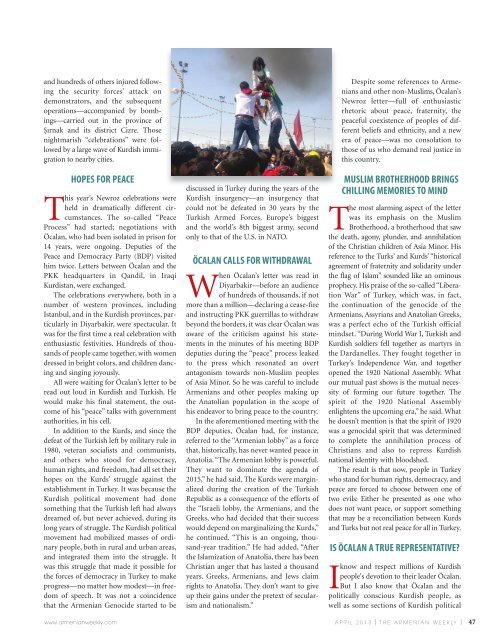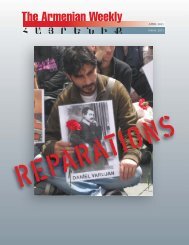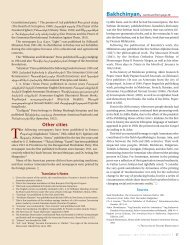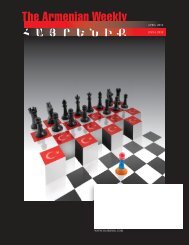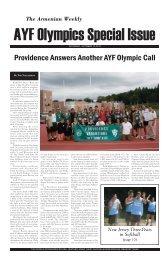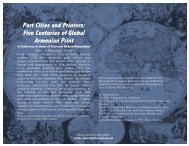You also want an ePaper? Increase the reach of your titles
YUMPU automatically turns print PDFs into web optimized ePapers that Google loves.
and hundreds of others injured following<br />
the security forces’ attack on<br />
demonstrators, and the subsequent<br />
operations—accompanied by bombings—carried<br />
out in the province of<br />
Şırnak and its district Cizre. Those<br />
nightmarish “celebrations” were followed<br />
by a large wave of Kurdish immigration<br />
to nearby cities.<br />
HOPES FOR PEACE<br />
This year’s Newroz celebrations were<br />
held in dramatically different circumstances.<br />
The so-called “Peace<br />
Process” had started; negotiations with<br />
Öcalan, who had been isolated in prison for<br />
14 years, were ongoing. Deputies of the<br />
Peace and Democracy Party (BDP) visited<br />
him twice. Letters between Öcalan and the<br />
PKK headquarters in Qandil, in Iraqi<br />
Kurdistan, were exchanged.<br />
The celebrations everyw<strong>here</strong>, both in a<br />
number of western provinces, including<br />
Istanbul, and in the Kurdish provinces, particularly<br />
in Diyarbakir, were spectacular. It<br />
was for the first time a real celebration with<br />
enthusiastic festivities. Hundreds of thousands<br />
of people came together, with women<br />
dressed in bright colors, and children dancing<br />
and singing joyously.<br />
All were waiting for Öcalan’s letter to be<br />
read out loud in Kurdish and Turkish. He<br />
would make his final statement, the outcome<br />
of his “peace” talks with government<br />
authorities, in his cell.<br />
In addition to the Kurds, and since the<br />
defeat of the Turkish left by military rule in<br />
1980, veteran socialists and communists,<br />
and others who stood for democracy,<br />
human rights, and freedom, had all set their<br />
hopes on the Kurds’ struggle against the<br />
establishment in Turkey. It was because the<br />
Kurdish political movement had done<br />
something that the Turkish left had always<br />
dreamed of, but never achieved, during its<br />
long years of struggle. The Kurdish political<br />
movement had mobilized masses of ordinary<br />
people, both in rural and urban areas,<br />
and integrated them into the struggle. It<br />
was this struggle that made it possible for<br />
the forces of democracy in Turkey to make<br />
progress—no matter how modest—in freedom<br />
of speech. It was not a coincidence<br />
that the <strong>Armenian</strong> Genocide started to be<br />
www.armenianweekly.com<br />
discussed in Turkey during the years of the<br />
Kurdish insurgency—an insurgency that<br />
could not be defeated in 30 years by the<br />
Turkish Armed Forces, Europe’s biggest<br />
and the world’s 8th biggest army, second<br />
only to that of the U.S. in NATO.<br />
ÖCALAN CALLS FOR WITHDRAWAL<br />
When Öcalan’s letter was read in<br />
Diyarbakir—before an audience<br />
of hundreds of thousands, if not<br />
more than a million—declaring a cease-fire<br />
and instructing PKK guerrillas to withdraw<br />
beyond the borders, it was clear Öcalan was<br />
aware of the criticism against his statements<br />
in the minutes of his meeting BDP<br />
deputies during the “peace” process leaked<br />
to the press which resonated an overt<br />
antagonism towards non-Muslim peoples<br />
of Asia Minor. So he was careful to include<br />
<strong>Armenian</strong>s and other peoples making up<br />
the Anatolian population in the scope of<br />
his endeavor to bring peace to the country.<br />
In the aforementioned meeting with the<br />
BDP deputies, Öcalan had, for instance,<br />
referred to the “<strong>Armenian</strong> lobby” as a force<br />
that, historically, has never wanted peace in<br />
Anatolia. “The <strong>Armenian</strong> lobby is powerful.<br />
They want to dominate the agenda of<br />
2015,” he had said. The Kurds were marginalized<br />
during the creation of the Turkish<br />
Republic as a consequence of the efforts of<br />
the “Israeli lobby, the <strong>Armenian</strong>s, and the<br />
Greeks, who had decided that their success<br />
would depend on marginalizing the Kurds,”<br />
he continued. “This is an ongoing, thousand-year<br />
tradition.” He had added, “After<br />
the Islamization of Anatolia, t<strong>here</strong> has been<br />
Christian anger that has lasted a thousand<br />
years. Greeks, <strong>Armenian</strong>s, and Jews claim<br />
rights to Anatolia. They don’t want to give<br />
up their gains under the pretext of secularism<br />
and nationalism.”<br />
Despite some references to Arme -<br />
nians and other non-Muslims, Öcalan’s<br />
Newroz letter—full of enthusiastic<br />
rhetoric about peace, fraternity, the<br />
peaceful coexistence of peoples of different<br />
beliefs and ethnicity, and a new<br />
era of peace—was no consolation to<br />
those of us who demand real justice in<br />
this country.<br />
MUSLIM BROTHERHOOD BRINGS<br />
CHILLING MEMORIES TO MIND<br />
The most alarming aspect of the letter<br />
was its emphasis on the Muslim<br />
Brotherhood, a brotherhood that saw<br />
the death, agony, plunder, and annihilation<br />
of the Christian children of Asia Minor. His<br />
reference to the Turks’ and Kurds’ “historical<br />
agreement of fraternity and solidarity under<br />
the flag of Islam” sounded like an ominous<br />
prophecy. His praise of the so-called “Libera -<br />
tion War” of Turkey, which was, in fact,<br />
the continuation of the genocide of the<br />
<strong>Armenian</strong>s, Assyrians and Anatolian Greeks,<br />
was a perfect echo of the Turkish official<br />
mindset. “During World War I, Turkish and<br />
Kurdish soldiers fell together as martyrs in<br />
the Dardanelles. They fought together in<br />
Turkey’s Independence War, and together<br />
opened the 1920 National Assembly. What<br />
our mutual past shows is the mutual necessity<br />
of forming our future together. The<br />
spirit of the 1920 National Assembly<br />
enlightens the upcoming era,” he said. What<br />
he doesn’t mention is that the spirit of 1920<br />
was a genocidal spirit that was determined<br />
to complete the annihilation process of<br />
Christians and also to repress Kurdish<br />
national identity with bloodshed.<br />
The result is that now, people in Turkey<br />
who stand for human rights, democracy, and<br />
peace are forced to choose between one of<br />
two evils: Either be presented as one who<br />
does not want peace, or support something<br />
that may be a reconciliation between Kurds<br />
and Turks but not real peace for all in Turkey.<br />
IS ÖCALAN A TRUE REPRESENTATIVE?<br />
Iknow and respect millions of Kurdish<br />
people's devotion to their leader Öcalan.<br />
But I also know that Öcalan and the<br />
politically conscious Kurdish people, as<br />
well as some sections of Kurdish political<br />
APRIL 2013 | THE ARMENIAN WEEKLY | 47


